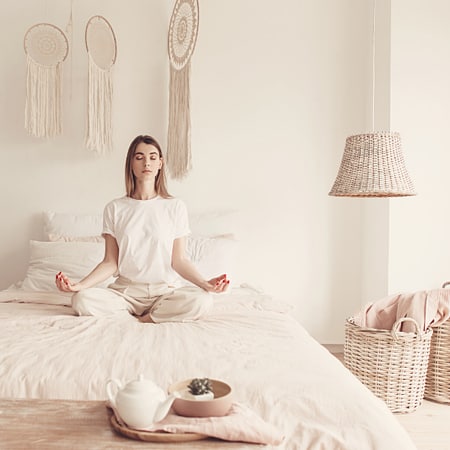If you have decided to begin a journey to work towards having a more peaceful, calm, and happy life, you have probably heard from many people that you should try meditation. While this is excellent advice, meditating can be hard at first. If you learn how to do it properly, it can be a fantastic addition to your day.
You are probably fall asleep during meditation because you are lying down, are short on sleep, or are meditating at the wrong times. If you want to avoid this, you should meditate away from your bed, do it when you have energy, and ensure you get a consistent quality night’s sleep.
Before you give up meditating because you can’t help but fall asleep while doing it, know that it is a very common concern for many people. If you want to learn more about why you may be falling asleep while meditating, why you may actually not be asleep, and how to avoid it, this article is for you.
Reasons Why You May Fall Asleep While Meditating
There are many different reasons you may be falling asleep while meditating, and it’s much more common than you may think. This is strongly due to the main reason that meditation is a time for you to relax and focus on your thoughts and feelings.
You may become a little too relaxed and less focused during this time, resulting in you passing right out. This is more likely to happen when you are a beginner or not a regular meditator. Your brains are thinking that you are ready to fall asleep, so it may take some time to learn how to balance your relaxation with your focus.
Below are some other reasons you may be falling asleep while meditating, all of which contribute to why you feel so relaxed and comfortable enough to fall asleep.

- You’re meditating in bed. One very obvious reason why you are falling asleep while meditating is that you are meditating in the exact same space you typically fall asleep. For many people, being anywhere near your bed just makes you feel tired. So if you are on your bed or even leaning on your bed, this may be a reason you are falling asleep during the practice.
- You’re meditating while lying down. Unless you are doing Yoga Nidra meditation prior to your bedtime, this is a guaranteed way to fall asleep while meditating. Putting your body in a very relaxed position of lying down will encourage feelings of being tired and, therefore, can cause you to drift off much easier.
- You’re in your pajamas. If you are someone who loves to stay in your pajamas all morning, you may be way too comfy during your meditation. If you are still in the same clothes you sleep in, your body may stay sleepy, and you will then be more likely to fall asleep.
- You’re just way too tired. According to the Melbourne Meditation Centre, passing out while you are meditating can just be your body’s way of telling you that it needs some extra sleep. If you are not getting enough sleep every night, your body is way more likely to take advantage of any relaxed moment in your day to catch up on sleep.
- You meditate when you have no energy. Another reason that can also be contributing to falling asleep is that you choose to mediate when you have no energy. This could be after you have eaten, after a workout, late at night before bed, or the second after you have woken up. While you don’t need a lot of energy to meditate, you need enough to remain focused at the moment.
You could be falling asleep for any of the above reasons or a combination of them. If you are looking for a solution to avoid crashing during your meditation, the tips we mention later on in the article can be very helpful.
Are You Really Sleeping or Just Think You Are?
Before you move forward and try out a bunch of different techniques to help yourself stay awake while meditating, have you ever thought of the possibility that you might not actually be sleeping?
If you were lying down or found yourself curled up in a ball, chances are you were sleeping. But, if you were sitting up and are not 100% sure if you were sleeping, you actually might not have been.
The Melbourne Meditation Centre suggests that it is possible for many people who think they fall asleep while meditating to be awake. During meditation, your body goes through similar processes as it does while you are preparing to sleep.
Sometimes the following things can happen that you may think only happen if you were sleeping, such as:
- Your head begins to get heavy.
- You may feel as if you are in a dream.
- Your thoughts become distant or do not make much sense.
- Your breathing becomes deeper and lighter.
- You remember random memories.
- You are dissociated, not remembering where you are and what just happened.
While it is possible that you did fall asleep, the state of meditation is somewhere between being asleep and being awake, so if you are new to it, you may actually just be better at it than you thought and entering into a deep meditative state.
Ways to Avoid Falling Asleep While Meditating
Below is a list of 11 different ways to avoid sleeping while meditating. While you don’t have to apply all of them to avoid falling asleep, if crashing during meditation is a regular occurrence for you, you may want to consider all tips below so you could have a great meditation session every time.
Set Intentions to Focus On
If you are going into your meditation without a clear goal as to why you are meditating, you not only may be more likely to drift off, but you also are more likely to focus on things that can ruin the time that is meant to be peaceful and relaxing.
So, before you start your mediation, you should take a couple of minutes to think about what you want to focus on while meditating. This can be anything ranging from just being mindful and present in the given moment to digging deep into any of your thoughts that may be popping up.
Once you have that intention, keep coming back to it as your mind wanders or you start to feel sleepy. Remember, this is just a small part of it. If you are doing any of the below things, having an intention will not keep you awake.
Meditate in an Upright Position
While a very obvious suggestion, you should not lie down while meditating unless you are doing Yoga Nidra or Body scan meditation. Even if you can do this on some days, it absolutely won’t work on days that other factors play into your low energy/sleepiness. As you lie down, your body is much more likely to get tired and fall asleep easier. So if you are going to meditate, make sure you are in an upright position.
Keep your spine straight and your chin up, as this will also promote better posture and less back pain. If you find it hard to relax like this, bring your back up against a wall and sit on a pillow, this will support your back but not be so comfy that you get tired and drift off during your meditation.
Don’t Meditate in Bed

No matter what you do, do not meditate in your bed. Some meditation teachers and experienced meditators highly recommend not to meditate in your bed or around your bed under any circumstances for many obvious reasons.
With your bed being used for sleeping, you are way more likely to start to become sleepy if you are on or near your bed. So pick a nice chair or a spot with a pillow on the floor to do your meditation practice.
Even if you are just sitting on your bed, or leaning on it, try to avoid it. Without much conscious effort, your body will just think it’s time to get tired and could fall asleep, so it’s best to leave the bed for nighttime when you really want to sleep.
Wait at Least 30 Minutes After Waking Up
If you want to meditate after you have woken up, it is best to give yourself about 30 minutes, so you know you are really awake. If you get a little movement in, even if it is just to make your bed and use the bathroom, it will wake you up a little and give you a little bit of energy.
If you are jumping out of bed to meditate, you will still be fairly sleepy as you haven’t given yourself enough time to wake up. If having a glass of water beforehand is something that could help, give that a try. And if you get anxious easily, a cup of coffee prior to your morning meditation may not be the best idea.
Don’t Wait Until You’re Too Tired
Just as meditating right after you wake up is not the best idea, so is waiting until the moment before you go to bed. This is especially true if you are going to bed later than normal, as this can cause you to fall asleep easily.
Whether it’s because it has already gotten dark out or that you may be too exhausted already, trying to meditate while you are tired and are about to get ready for bed is not a good idea. When it’s too close to bedtime, your body will take your increase in relaxation and your closed eyes as a signal that you’re ready to sleep.
Note: If you have problems falling asleep, then using guided Yoga Nidra or Body Scan meditations for falling asleep is an entirely different story. These two types of meditation are widely used for insomnia.
Wash Your Face Beforehand
If you are going to meditate in the morning or still prefer to have it as part of your nighttime routine, wash your face first with warm-feel-like water. Whether or not you actually wash it is up to you, but by splashing water on your face a bit beforehand, you will feel more awake instantly.
While this is not the key to finding more energy, it will definitely wake you up enough to get you through meditation without getting too tired.
Don’t Wear Your Pajamas
If you are doing your meditation practice in the morning or later on, change your clothes into the ones you are planning to wear that day (if you stay at home).
If you stay in your pajamas, your body will remain in bedtime mode, and you will feel too relaxed just by being in any type of cozy clothing. By staying in cozy pajamas, you may also just be so comfortable, and sleeping becomes much easier for you.
Get a Decent Amount of Sleep
If you are falling asleep during your meditation, especially more often than you think, you should probably take the hint that your body needs a good long snooze. If you are not getting a consistent and decent amount of sleep, your body will try its best to make up for it, and no better time when you are relaxed with your eyes closed.
The Mayo Clinic says that you should be getting approximately 7-9 hours of sleep per night once you turn 18, and while the amount of sleep you need differs for everyone, adequate sleep is an essential part of living a healthy life.
If you think this may be the reason you are dozing off during your meditation sessions, here are some other clues that sleep deprivation or a lack of sleep could be the reason:
- Feeling increasingly stressed or depressed
- Moodiness
- Low sex drive
- Memory issues
- Having trouble thinking or concentrating
- Weight gain
- Increased accidents (being more clumsy than normal)
- Poor balance
- Weakened immune system
While not all the symptoms above indicate that you need more sleep, if you experience the majority of them, it may be time to rest for a little longer each night.
If sleeping is an especially difficult task for you, or you find yourself sleepy even after a consistent good night’s sleep -this may be an indication of a deeper healthcare concern. In this case, you should talk to your doctor about it.
Drink Water Before Meditating
By drinking water before you meditate, you can increase your energy levels substantially, and by doing so can get you ready for your meditation. Just be careful not to drink too much, or you may find yourself being interrupted by your body for reasons other than sleeping.
Wait 20 Minutes After Eating
After you eat, your body needs most of the energy you have to digest and process your meal. So if you eat a big meal, or eat in general, it’s best to give yourself at least 20 minutes before meditating.
If needed, wait up to an hour after so you can utilize the energy in your meditation from the energy you got from the food you just ate.
Do a Walking or an Open-Eye Meditation
If you fall asleep because you find it very hard to focus while sitting still with your eyes closed, you could also try a walking meditation or a meditation with your eyes open.
A different but still fulfilling meditation is one that you can do while walking around outside, and breathing in some fresh air can be an added bonus. If you are interested in trying this out, here is a video of a guided walking meditation that you can listen to:
If you want to try out meditating with your eyes open, all you have to do is open your eyes. It is best to fix them on something within your point of view, but not something that causes you any stress or will make you distracted.
To learn how to do an open-eye meditation as well as the difference between an open-eye and close-eye meditation, watch the video below:
Final Thoughts
While falling asleep during meditation is very common, it definitely defeats the purpose of meditating in the first place. Although the state of your body while meditating is very similar to when you are sleeping, so before you think you are snoozing off during your meditation, you may actually be in a deep meditative state.
However, if you are sleeping by the obvious clues of lying down or being curled up in your bed, there are many things you can do to avoid falling asleep.
While not everything has to be done, by making sure you meditate while sitting up, are not in bed, have intentions set for your meditation, and by getting a good quality sleep every night, you are on the right track. By drinking water, washing your face, and not eating beforehand, you can also increase the energy you have to keep yourself awake throughout.








